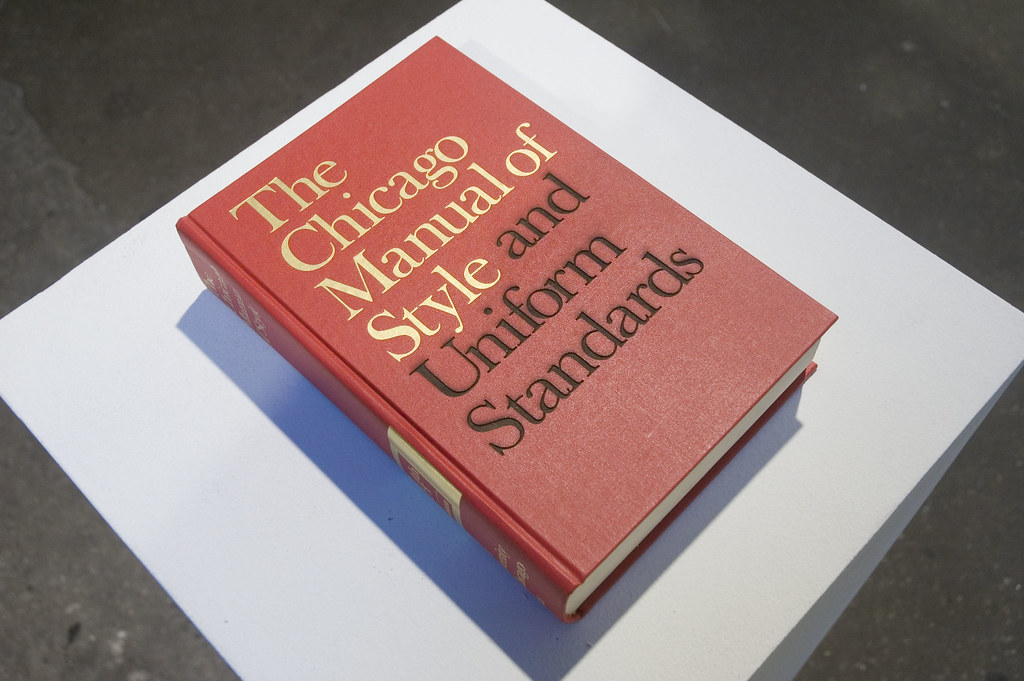According to reports, in the 18th edition of the Chicago Manual of Style, location will no longer be required for citing a book. The editors of the Chicago Manual of Style are of the opinion that place of publication is no longer needed to locate an exact source. To some extent, this is fair. Between date of publication and author and edition, a reader can often find the source without city of publication. And authors using Chicago style may still include place of publication, even if not required. Yet this change is a bad thing. Even if few people are directly affected, the change reflects false promises and malfunctioning markets in our culture.
Every year, citation style guides make some changes. Typically, they are reflective of changing times. Once style guides had no way to cite websites, then they did. New technologies require decisions, because a citation guide can neither be too far ahead of the population nor too far behind. Should it be email or e-mail? Sometimes style shifts reflect changes in grammar reflective of changes in culture, like a singular “they” in professional writing. For many people, these changes and updates mean little or nothing. Most Americans do not regularly use any style guide and never cite anything. But sometimes these changes mean something for all of us.
The idea of books without places of publication is utopic. It is like More’s Utopia—literally “no place.” We live in a world where many people believe it is possible to be divorced from place. Nevertheless, it is impossible to be completely divorced from place. Everything is somewhere. Even the idea that the world around us will be replaced by an online world or that everything can exist “in the cloud” is silly. Even servers are somewhere. Nothing is nowhere. The digital world takes up space in our physical world and puts demands on physical resources.
Believing that things can exist without being somewhere is irresponsible because it makes it easier to ignore what things cost. Bitcoin does not exist on paper, the blockchain happens in the web. But bitcoin does exist on power grids. Blockchain demands actual electricity. It adds up. Crypto currency may not be consuming the majority of the world’s power, but it puts quite a bit more strain on the power grid than you and your neighborhood. Mining cryptocurrency can also cost water and be noisy. Even apart from cryptocurrency, rural fields can become server farms. The digital world can consume our neighborhoods and nearby farmland. It is not “nowhere.”
In 2024, many people are banking on fantasy futures. We are told that AI will do our jobs, make our movies, be our significant others, and counsel us through our depression. It will be cheaper and easier than what we have now. (AI costs electricity, too, by the way.) We are told that our refrigerators can be “smart.” Meanwhile we are being dumbed down. We buy products that are impossible to repair and can only become obsolete. We are told that EVs will help our environmental problems, while their batteries create their own (for now ignored) environmental problems. We are constantly being presented a false promise of a world where things cost nothing and our environment is not affected by our decisions. It is indeed a false promise.
The decision by the Chicago Manual of Style also reflects book publishers’ desires. Increasingly, publishers—especially academic publishers—are attempting to avoid actually publishing. It is their desire to only produce content online, not on paper. That allows them to save money. It also allows them to “sell” “content” with limited access. Textbooks aren’t just rented in physical form: students now pay for online access to material which ends when the semester ends. Publishers are going all in on the leasing and subscription model which is popular across many industries. Public pressure forced BMW to drop their plan to charge $18 a month for heated seats, but since that happened a couple years ago, all kinds of auto makers have quietly introduced it themselves. Academic publishers are strongarming faculty who want printed copies of textbooks and who want students to be able to own their learning materials. This has been happening for years. In 2019, Pearson announced their intention to phase out printed materials. Campus bookstores now want students to sign up for digital materials only, always rented.
The Chicago Manual of Style is doing what many universities are doing, yielding to pressure. They ought not. This is a clear case of a handful of very large publishers attempting to decide what the market should do. This is not a case of the market deciding the future—student and faculty desires are irrelevant in this case. This model makes life easier for publishers. They intend to make it our shared future. This is an indication that the market is not healthy and that the publishers are too big. It is also a reminder that consumers need to do more—why not a coalition of universities that want them demanding print publications? (I have made this argument before about putting more pressure on publishers.)
Those who talk about the advantages of a no-print, no-ownership, no-place model are like Raphael Hythloday in More’s Utopia. His name means “talker of nonsense.” Digital copies can and should exist, but they should not preclude the possibility of actual print on actual paper printed on actual machines in an actual place. We live in a physical world. Our books should exist in that physical world. We are physical creatures. We should be able to hold books in our hands if we wish. And the idea that things can exist without a place is an impossibility.
The Chicago Manual of Style is not to blame for any of these trends. The editors’ decision does not shape as much as reflect our culture. However, what is the purpose of citation? It is not to torture undergraduates. The purpose of every citation style is to enable readers to find the exact source of any reference. A citation style is responsible for connecting readers with existing knowledge, past and present. All of that knowledge has come from somewhere. A citation style that does not include location is participating in creating a false sense of the present, one in which place does not matter.
Image via Flickr






1 comment
Madeleine
I love this–you’ve given me food for thought as I write up a bibliography. I might have gone ahead without a thought. What do you think about how one ought to go about the placelessness within place citations? Take for example a piece written in Kentucky and of Kentucky that may well be cited as “California” depending on the locations of the publishing houses. Is there a way to play by the rules and represent this? I always wince when citing a Berry book as New York or California.
Comments are closed.